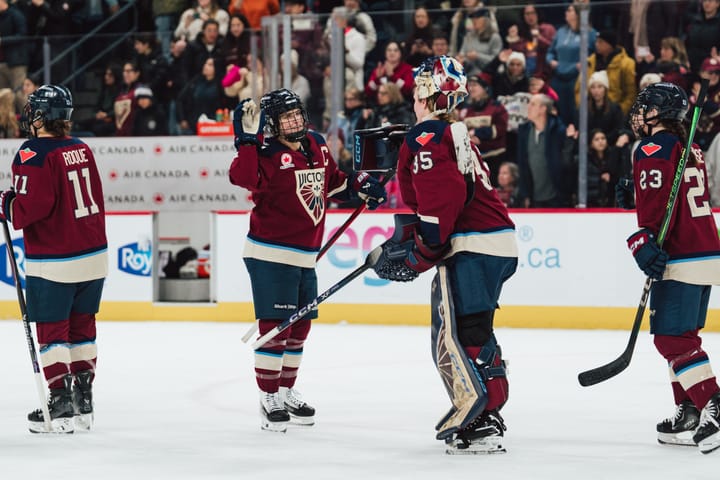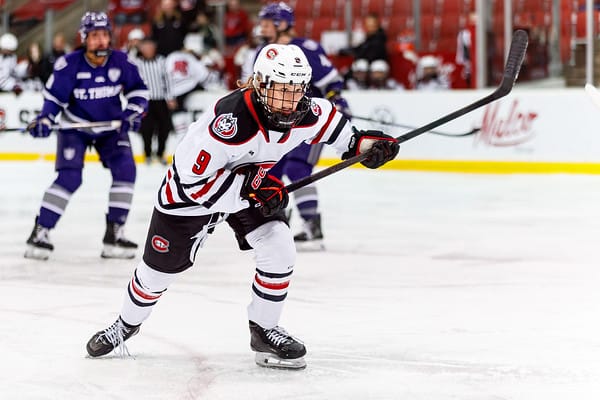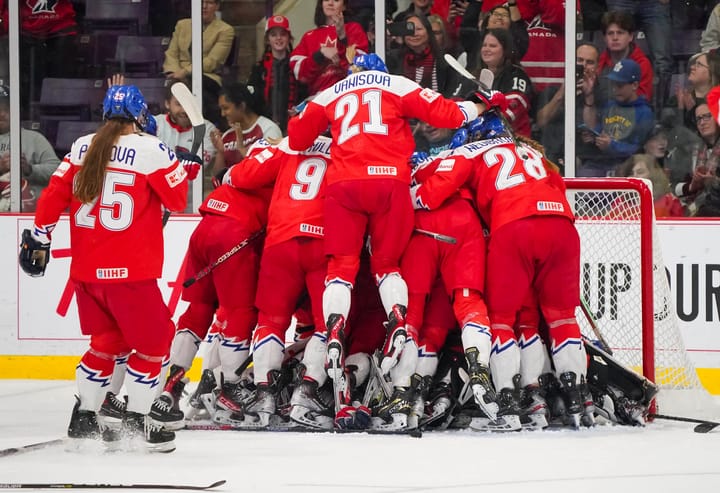Q&A with the recently retired Jacquie Pierri
What’s changed, what’s next, and what she’ll miss after retiring from the Inferno
Last week, Calgary Inferno defender Jacquie Pierri announced her retirement after five years in the CWHL. She graciously took the time to answer some questions about her career for The Ice Garden.
The Ice Garden: First, congrats on a fantastic five year career! Was there a particular reason why you decided to hang up your skates? When did you know that this was going to be your last season?
Jacquie Pierri: Thanks! I actually thought the 2016-17 season would be my last, but I wasn’t satisfied leaving on that terrible final game loss (there is nothing like sports rivalries). I’m so grateful that I didn’t! This was one of the most fun seasons of my life.
In terms of timing, I knew at some point I would have to put my full efforts towards my career. In the fall I started applying to grad schools and new positions at work. Luck was on my side and I accepted a new position working on green energy — initiatives something I’m really passionate about. The position required me to move to Edmonton so I knew around December that this was my last season (my boss was kind enough to allow me to delay my move until post-season). But then, a week or two ago, I found out that I was accepted into grad school. I will be pursuing my Masters of Sustainable Energy Systems in Barcelona next fall (and unfortunately there isn’t a women’s pro team there).
TIG: You scored four goals this year, including your first CWHL goal. What was different this year? What was it like to score that first goal and step up into a more offensive role?
JP: That first goal, honestly, was embarrassing. You’d think in five years something would at least accidentally bounce off me and end up in the net (ha). But also it was a huge weight off my shoulders and it helped with my confidence the rest of the year.
I’ve always seen myself and identified myself as a stay-at-home defenseman. This year I had a coaching staff that challenged me on that and believed I could do more. Their encouragement really helped me to see the game differently and be a two-way player. I wish I had a few more years to develop my offense, I feel like this season was just the tip of the iceberg. I always measured my success in plus-minus and goals against and felt that it was someone else’s job to score the goals but I’m glad I had one season seeing things differently.
TIG: When you tweeted about your retirement, you tweeted about some things you’ve seen change in the past five years. What’s been the biggest change you’ve seen in the CWHL or women’s hockey in that time?
JP: I don’t even know where to start. The level of play, the brand awareness, the connection with the youth community, the financial implications of playing ... I could go on for hours about how far we’ve come (and another while about how much still needs to change).
With bittersweetness, it's time to announce that my time in the CW is up. I'm grateful knowing that I leave my @InfernoCWHL in great hands. In memory of my 5 seasons, I present #5YrsOfProgress: a thread. #Retirement #PlayTrue #LeavetheJerseyBetterThanYouFoundIt
— Jacquie Pierri (@ouiweejacquie) May 4, 2018
It was really expensive to play my first year. We paid for tryouts, off-ice training, meals on the road (and all the meals in Calgary since we didn’t have time to food prep). My skates broke down on me, those were expensive. Sticks.
And all that said, in my first year we still had flights, hotels, and ice covered. I was lucky enough to have a job that allowed me to make that cost work, but a lot of players don’t.
Not only that, we also had to self-run fundraising initiatives like loser pools and auctions. It was a serious time-burden. Now [Inferno GM Kristen] Hagg takes care of all of that (she’s amazing by the way). As that financial piece continues to gain momentum and players can come in and actually just play hockey, were going to see more talent stay in the game after NCAA and CIS.
TIG: What’s a “loser pool”?
JP: Loser pool is just a format for betting on NHL games. We would require every player to get 10 people from their family/friends to put in $10, I think. Part of the money went to our fundraising and part to the winner. If we didn’t get ten people to buy in, we had to individually cover the missing dollars. This was an Inferno-specific initiative, not a league one. It was a pain for everyone to bug the people who already support us. I also ended up running the spreadsheet and managing all the picks coming in by email. It was brutal even with all the excel wizardry built in the background. I think we did it my first three years and I think the year before I mailed [Inferno player Erica] Kromm a check to help out.
TIG: You mentioned you had to pay for your own skates and sticks. Do you still have to or does the team/league take care of those now? If it’s changed, do you remember which season it did?
This past season was the first season that we received sticks. We got one stick each for the year (mine did not last the whole year, but the sponsored Olympians shared). In years prior we received only team uniform gear (helmets, gloves, and pants).
TIG: What will you miss the most about playing in the CWHL?
JP: Easy question. My teammates. I have met some really amazing people playing in the CW. Impressive people (lawyers, PHDs, moms, and more) but also just really good supportive friends.
I will also miss all the community work. The Jr. Inferno partnership gives me a huge amount of pride as a player. Start the Spark, You Can Play, Keep the Beat - all of the initiatives that give us the opportunity to bring awareness to important causes.
TIG: What’s your favorite memory from your five years?
JP: Post-Clarkson Cup win shenanigans :)
TIG: What’s next for you?
JP: Barcelona!
TIG: Is there anything else you’d like to add?
JP: I feel really grateful. These past five years have been an amazing opportunity. Thank you to my teammates. Thank you to all of our underpaid and non-paid staff who put in so much time to make this all work. Just thank you.





Comments ()